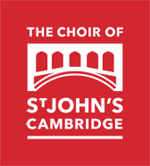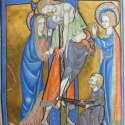An interview with Jonathan Dove
Posted on: 15 July 2024

Magnificat 4 includes two commissions written specially for the Choir of St John's College; Jonathan Dove's 2022 canticle setting St John's Service, and Judith Weir's 2011 service of the same name.
Winner of the 2008 Ivor Novello Award for classical music, Jonathan Dove CBE has composed a broad range of works and is one of the most successful British composers today.
Jonathan was kind enough to share insights into his St John's Service, the compositional process, and what we can look forward to in the future.
You’ve written canticle settings for the choirs of Portsmouth and Wells Cathedrals, but what makes the St John’s Service unique?
What’s unique is the dancing character of these canticles. The new St John’s Magnificat is an ecstatic dance with seven lively beats to the bar, while seven slower beats give a gentle lilt to the serene Nunc Dimittis. This is very different from my trance-like first set of canticles, for Wells, and the quivering energy of the setting for Portsmouth.
Is it a compositional challenge to set such well known texts as the Magnificat and Nunc Dimittis in a new way?
The biblical scenes that give rise to these texts are momentous and dramatic — the angel’s annunciation to Mary, and Simeon’s recognition of the infant’s divinity. These scenes and these words have been endlessly inspiring to composers, and I think every time we look at them, we see them in a different light.
Are there any compositional techniques that were specifically selected with the St John’s Sound in mind?
I was thinking more of the character of the music than the specific choral sound, as Director of Music Andrew Nethsinga had a very particular idea of the kind of music he wanted me to write. He asked for the work to have a lively, flamboyant organ part, and to be fun to sing and to listen to. I followed his advice, and it was a great pleasure to imagine such a piece.
Do you have any particular influences when you’re writing choral music (or sacred choral music)?
Benjamin Britten has been an enormous influence in every aspect of my composing life. As a child, I loved listening to an LP of his Ceremony of Carols and Missa Brevis. The Gloria of his Missa Brevis is in 7/8, and that may unconsciously have influenced my choice of metre for the St John’s Service.
Is your compositional process different when you’re compositing a liturgical piece versus an opera (for example)?
Although canticles or anthems are very different in scale to operas, for me they are both dramatic; and so, with both, composition begins with finding the right tone, the right mood, the right energy, the right instrumental and harmonic colours for the dramatic situation — and then exploring ways of singing the words. In a church or cathedral the orchestra is an organ, which has at least as many different colours as there are different instruments in a symphony orchestra. There are important differences, of course: sacred or secular; congregation or audience; highly reverberant, echoing spaces or drier ones; but they have a lot in common too.
Are you currently writing any more liturgical music?
I’ve just finished an opera, and I’m currently working on a clarinet concerto and a secular oratorio. I’ll be writing a new anthem next year.
Is there any personal significance to featuring on Andrew Nethsingha’s last album with the Choir?
While I was an undergraduate at Trinity College, Cambridge, I was foolishly unaware of the rich choral tradition that was living all around me. I have since discovered the glories of these choirs by writing for them — first for King’s, and then for Trinity. I am overjoyed at last to have written for St John’s, and while Andrew Nethsinga was directing the choir.
Listen to Jonathan Dove's St John's Service now.
Read more about this piece and the whole album in George Herbert's excellent notes.
Jonathan Dove's St John's Service was kindly commissioned for the Choir by Dr Kamal and Mrs Anna Ahuja. This setting is dedicated to the memory of Professor Sir Christopher Dobson, the late Master of St John's College from 2007—2019.
Image: Marshall Light Studio
Organists’ Review


